Current/Recent Projects

Agri-Advisory Services: The Role of Co-operatives
Agri-advice has always been central to agricultural development and innovation. As agriculture is now facing an increasingly challenging and transitionary period, there is a renewed focus on the role and nature of agri-advice. A transition to sustainable agriculture requires an agri-advisory response which draws on the agency and knowledge of the farmer(s), is more tailored to a particular local context and encourages the sharing of knowledge and experimentation across farms in a landscape. This farmer-centric co-operative and landscape-based approach requires existing institutions within that landscape to facilitate and enable such knowledge brokerage. Co-operatives, with their proximity to the farmer and local embeddedness, would seem to be well placed to be key players in this future agri-advice domain.
The purpose of this study was to explore the extent, nature, delivery and potential future development of agri-advisory services in agriculture co-operatives (dairy and livestock). The study was completed by the Centre for Co-operative Studies, UCC and was funded by the Golden Jubilee Trust
Aims and Objectives
- What is the nature and extent of agri-advisory services offered in agricultural co-operatives?
- What are the delivery and support structures for agri-advisory in agricultural co-operatives?
- What is the potential for enhancing the agri-advisory service in agricultural co-operatives?
Methodology
The research involved online surveys with both Dairy and Livestock Co-operatives, a survey with next generation dairy farmers, interviews with intensive dairy farmers who are experimenting with environmental measures on their farms, interviews with key witnesses close to both dairy and livestock mart sectors and interviews with key witnesses from other co-operatives with a role to play in the agriadvisory context. These other co-operatives included FDC Group, IFAC, FRS and Cultivate Credit Unions. However, the primary focus of the research was on the Dairy and Livestock Co-operatives. The research was structured around the following three research questions.
Full Publication
The full publication can be viewed here:
Co-operatives and Agri-Advice Report UCC CJT.pdf
Funder and Project Dates
This project has been funded by the Golden Jubilee Trust

___________________________________________________________________________________________________
The Journal of Co-operative Studies
The Journal of Co-operative Studies, including archive, is now freely available on the following link:
http://www.thenews.coop/collection/journal-of-co-operative-studies/
_____________________________________________________________________________________________________
CO-AGE: Exploring the Potential for the Development of Care Co-operatives to Support Older People to Age Well at Home
Meeting the care needs of an ageing population presents a significant challenge for Irish society. This research, conducted in collaboration with Age Action Ireland, explores the potential to develop co-operatives to provide care services and support independent living and healthy ageing in the community. Co-operatives are organisations that are owned, governed and operated by service users and producers. They offer an opportunity for older people and their families to shape the design and delivery of services, thereby empowering care recipients and improving their experience.
Aims and Objectives
- To assess the level of interest among stakeholders in establishing homecare co-operatives in Ireland
- To identify the practical and policy supports needed to facilitate establishment of co-operatives
- To explore how existing knowledge and expertise, within communities and the co-operative sector, can be leveraged to support the development of co-operatives.
Methodology
The research involves engagement with a range of stakeholders, including people aged 55+ who have insights into caring for older people and/or have an interest in planning for their own future care needs.
Keywords: Eldercare, Co-operatives, Co-production, Homecare, Agency in older age, Care policy.
Funder and Project Dates
This project has been funded by the Irish Research Council’s New Foundations Programme and runs from December 2021 - August 2022.
Contact
Dr Carol Power (PI) Centre for Co-operative Studies, Cork University Business School; email cpower@ucc.ie

___________________________________________________________________________________________________
ENERGISE Project 2021-22: Enhancing the Transition to Energy Citizenship
Slow progress on energy efficiency is undermining efforts to achieve SDG7 (Affordable and Clean Energy) targets. Energy efficiency improvements, such as insulation and retrofits, help reduce energy expenditure and increase the affordability of energy in poorer households. While the Irish government has introduced measures to promote domestic energy efficiency to support lower income households, many of these measures require additional capital investment by households. Even where additional capital investment is not needed, there is limited uptake among lower income households due to lack of accessible information, ineligibility, or competing priorities. Evidence suggests that household-level face-to-face advice and support on improving energy efficiencies for low income households is needed and charities can operate effectively in this space.
Aims and Objectives
In this project researchers from UCC will work with the Money Advice and Budgeting Service (MABS) to explore the barriers and enablers to greater energy efficiency in the home, and provide a set of practical guidelines and case studies to promote greater efficiency. The research will thereby help to progress SDG7 (Affordable and Clean Energy) and provide financial savings to low-income households.
The project sets out to:
- critically review national policy on energy efficiency in the home;
- explore MABS’ service users’ attitudes and practices in relation to household energy efficiency, and identify the barriers to increasing household energy efficiencies;
- identify the measures and supports needed to overcome these barriers;
- develop guides, infographics and good practice peer group case studies that will enable MABS to support their service users in improving household energy efficiency;
- provide policy insights to support MABS in making submissions to government on improving the accessibility of energy efficiency initiatives to low income households.
Project Outputs
McCarthy, O. and Harris, G. (2022) 'ENERGISE: Enhancing the Transition to Energy Citizenship', ISS21 seminar, 27 January 2022. Click on the links to access the ENERGISE seminar slides and presentation recording.
McCarthy, O., Harris, G. and Amato, A. (2021) ENERGISE: Enhancing the transition to energy citizenship: Connecting households, MABS Policy Briefing Paper, December 2021.
McCarthy, O. and Amato, A. (2021) 'Why retrofitting homes will be difficult for low income households', RTE Brainstorm, 8 November 2021.
Project Funding and Duration
This project has been funded through the IRC New Foundations programme from 2021-2022.
Contact
Dr Olive McCarthy (PI) Centre for Co-operative Studies, Cork University Business School at o.mccarthy@ucc.ie

___________________________________________________________________________________________________
Financial Inclusion of Social Housing Tenants 2021
The aim of the research, which was undertaken by University College Cork (UCC), Centre for Co-operative Studies and the Financial Services Innovation Centre, was to explore the current status of low-income residents of social housing in Ireland in terms of their access to and use of financial services, with a particular focus on savings and credit. The research was funded by Cluid Housing and the Housing Finance Agency. The report was officially launched by the Minister for Finance, Paschal Donohoe TD on Wednesday 16th June 2021.
The full report can be downloaded here.
A shorter paper on the practice and policy implications of the paper has been published by the UCD Geary Institute on publicpolicy.ie here.
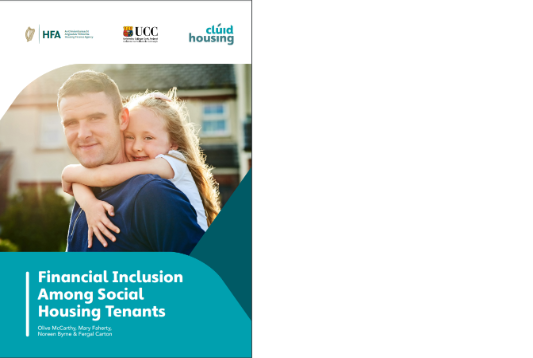
_____________________________________________________________________________________________________
Credit Union Social Impact Measurement and Reporting 2020-21
The focus of this paper is on establishing how social impact measurement and reporting is viewed by Irish credit unions, what the barriers to engagement are, and how credit unions feel they can be supported in getting started. It is an exploratory piece, opening up ideas and concepts and offering a starting point for further discussion and debate on appropriate ways forward for those credit unions that wish to progress on the social impact measurement and reporting journey.
Full report can be downloaded here.
Journal article here: McCarthy O. (2021) Social impact measurement and reporting for Irish credit unions, International Journal of Co-operative Accounting and Management, 4 (2): 4-16.
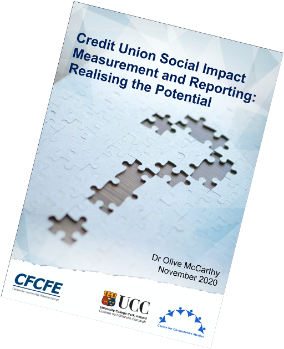
___________________________________________________________________________________________________
Journal of Co-operative Studies
The Journal of Co-operative Studies is a peer-reviewed international academic journal, which aims to promote knowledge, research and innovation within the co-operative sector. It publishes articles on a wide range of subjects within the fields of co-operative enterprise, organisation and management.
Its primary focus is acting as a bridge between academics and practitioners in advancing knowledge and understanding of co-operation.
Visit the UK Society for Co-operative Studies website at www.ukscs.coop.
Visit the Journal of Co-operative Studies website at https://www.ukscs.coop/resources/journal-of-co-operative-studies-vol-54-no-1.
____________________________________________________________________________________________________
Community-led Housing: Making It Happen - Seminar Proceedings
GOLDEN JUBILEE TRUST GRANT 2017 - "Go Co-op: Cases of recent Irish co-operative start-ups"
Are co-operatives still being set-up in Ireland? And, if so, for what?
These questions have been explored by Aisling Moroney, Bridget Carroll and Olive McCarthy in a project featuring case studies of Irish co-operative start-ups:
Go Co-op: Cases of recent Irish co-operative start-ups
_____________________________________________________________________________________________________
Research Study on Client Experiences of the Money Advice and Budgeting Service
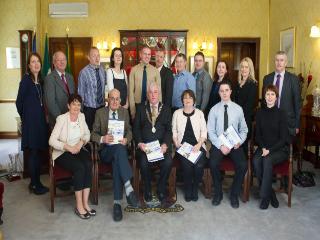
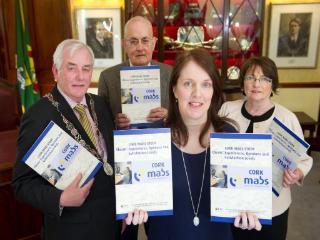
Conference on Financial Exclusion and Consumer Debt Research
The Centre for Co-operative Studies has recently been awarded funding by Combat Poverty Agency, to host a conference on Financial exclusion and consumer debt research.
The conference will bring key researchers in these areas together to disseminate their findings collectively and to act as a forum within which issues in financial exclusion and over-indebtedness in Ireland can be explored and debated by researchers policy-makers, regulators, financial service providers (especially credit unions), social partners, organisations working to combat financial exclusion, and politicians.
The event is intended to help to continue to raise awareness of the issues surrounding financial exclusion and over-indebtedness in Ireland and to identify key areas for action and for further research. It is proposed to hold the event in Aula Maxima, University College Cork during September, 2007.
_____________________________________________________________________________________________________
Book Series
The Centre was commissioned to write a series of six books by Oak Tree Press.
The first of the series has been published and is entitled ‘Helping Ourselves: Success Stories in Co-operative Business and Social Enterprise’.
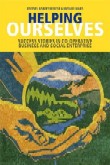
To find out more about the book click here.
___________________________________________________________________________________________________
Department of Agriculture and Food
Research Stimulus Fund: (M. Ward, O.McCarthy, R. Briscoe, M. O'Shaughnessy): Funding was awarded for a project examining Effective Structures for Farmers' Markets.
This is a three-year project from October 2006 to September 2009. Ms Aisling Moroney has been appointed to undertake this research as part of her PhD.
_____________________________________________________________________________________________________
Combat Poverty Agency
Policy Research: (N. Byrne, O. McCarthy, M. Ward): Funding was awarded for a research study entitled 'Evaluation of the Credit Union and MABS Services in terms of their impact on the Financial Capability of Low-Income Groups'.
This research will directly build on recent research carried out by Byrne, McCarthy and Ward (2005) which highlighted that while access to financial services is essential, it also vital to ensure that people have the ability to use these financial services. The overall aim of the proposed research is to evaluate the credit union and MABS services in terms of the standard service and targeted pilot initiatives in terms of their effectiveness in building financial capability. The research will commence in early 2007.
_____________________________________________________________________________________________________
President's PhD Scholarship
The President's PhD scholarship (College of Arts, Celtic Studies & Social Sciences and College of Business & Law) will fund a student to undertake a PhD on credit union governance from 2006-2009. The scholarship will cover the PhD fees of a full-time student for 3 years.
Mr Ted O'Sullivan has been appointed under the terms of this scholarship.
_____________________________________________________________________________________________________
EMES
EMES is a research network of established university research centres and individual researchers whose goal is to gradually build up an European corpus of theoretical and empirical knowledge , pluralistic in disciplines and methodology, around “Third Sector” issues. For more information see here.
_____________________________________________________________________________________________________
Meeting the Credit Needs of Low Income Groups
Credit Unions-v-Moneylenders: (N. Byrne, O.McCarthy and M. Ward)
The research for this study was funded under the Poverty Research Initiative 2004 of the Combat Poverty Agency. The study focused on examining the service of the credit union and the moneylender in terms of credit provision to low-income groups. The research also estimated the extent of moneylending in two communities in Munster. It was found that a significant number of people borrow from moneylenders but that well over half are simultaneously borrowing from mainstream sources, in particular the credit union.Within the literature, borrowing from a moneylender is seen as an indicator of being excluded from other more affordable sources of credit. However, in Ireland borrowing from a moneylender is not a clear indicator of financial exclusion, as a significant proportion of moneylender borrowers are also borrowing from mainstream sources. This analysis also brings out the nature of the borrower and moneylender relationship which is based on tradition, convenience and the development of a close relationship which can create the basis for dependency.We conclude that any policy approach must not only focus on access to financial services but must also equally focus on financial education and regulation.
The research is published under the Combat Poverty Agency Working Paper Series as Working Paper 05/05.
_____________________________________________________________________________________________________
